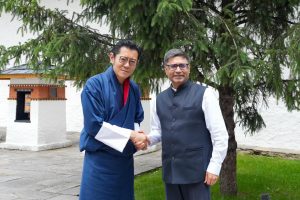India’s ex-deputy national security advisor (NSA) and newly appointed foreign secretary, Vikram Misri, was on a two-day visit to Bhutan from July 19-20. His visit to Thimphu came on his fourth day in office as the foreign secretary, reflecting Bhutan’s strategic primacy in India’s ongoing border conflict with China.
Misri is among India’s most experienced diplomats. He served as India’s ambassador to China for two years (2019-20) – a period marked by heightened tensions with China, including a major violent clash in Galwan Valley in June 2020. As the deputy NSA, a key position in India’s National Security Council Secretariat (NSCS), Misri is believed to have played a vital role in India’s border talks with China.
Now, as the foreign secretary, Misri will have more public visibility and engagement than he did during his NSCS stint, and Bhutan will provide a vital kickstart to his new role. With his extensive diplomatic experience in China, Misri’s visit to Bhutan highlights the Modi administration’s increasing focus on securing northern borders.
Misri’s visit to Bhutan comes four months after Prime Minister Narendra Modi’s visit in March 2024. Amid high-voltage campaigns for crucial parliamentary elections in April and May 2024, Modi’s last-minute visit to Bhutan indicated New Delhi’s quest to engage with the newly elected Bhutanese Prime Minister Tshering Tobgay.
One of the critical reasons that Modi squeezed in a visit to Bhutan – despite India’s Election Code of Conduct in place, limiting his external engagements – was to deepen India’s bond with Tobgay, who is seen as closer to Delhi than his predecessor, Lotay Tshering.
Under Tshering’s tenure (2018 to 2023), Bhutan engaged in multiple rounds of border talks with China. During this period, several high-level Bhutanese and Chinese delegations met both in China and Bhutan to negotiate and discuss boundary issues.
One significant meeting was the 12th Expert Group Meeting (EGM) on the China-Bhutan Boundary Issues, held in Thimphu from May 24-25, 2023. These talks underscored the ongoing efforts by both Bhutan and China to address and resolve their border disputes through diplomatic dialogue.
These bilateral talks reportedly created a sense of alienation in Delhi, which was not party to the discussions despite being at the forefront of defending Bhutan against People’s Liberation Army (PLA) incursions. New Delhi was also concerned about China’s regular emphasis on forging diplomatic ties with Bhutan.
The timing of Misri’s visit is noteworthy. Just last week, Modi was on a two-day visit to Russia. Despite mounting pressure from the West, Modi’s visit to Russia was primarily focused on counterbalancing China. Against the “no-limits alliance” between Russia and China, Modi seems to have revived historical ties with Russia.
While India intends to continue trade with Russia in energy and defense, New Delhi also looked at President Vladimir Putin as a reliable mediator in case China makes unilateral military moves at the Line of Actual Control (LAC).
Taken together, the two visits complement India’s comprehensive strategy to counter China’s threat. Misri’s Bhutan visit provided a closer look at the PLA’s deployment in the Himalayas, especially in tri-junctions such as Doklam connecting China, Bhutan, and India. Modi’s visit to Russia was more focused on material and messaging.
Bhutan is in a critical geographical location, as its long border with Tibet provides India with an important military buffer. In 2017, India took a stand against the PLA and its aggressive infrastructure building in the Doklam trijunction – an area of 100 square kilometers comprising a valley and a plateau at the junction of India, Bhutan, and China. This region is crucial, as it is a contested area between Thimphu and Beijing.
Had India not intervened in 2017, the PLA would have extended their reach dangerously close to India’s Siliguri Corridor – a narrow stretch of land just 20 kilometers wide that links the rest of India with its northeastern region. The corridor serves as a critical lifeline connecting India’s two geographies for the movement of people, army and goods.
For India, Bhutan is an indispensable ally in countering China’s territorial ambitions. Therefore, Misri’s visit showcased India’s focus on China.
Besides the strategic considerations, the key highlights of Misri’s Bhutan visit included his meetings with Bhutan’s King Jigme Khesar Namgyal Wangchuk, Prime Minister Tshering Tobgay, and Foreign Affairs Minister D.N. Dhungyel.
These engagements included discussions of China, strengthened diplomatic ties, Indian development assistance, and the inauguration of infrastructure built through Indian aid. Misri co-chaired the third India-Bhutan Development Cooperation Talks for Bhutan’s 13th Five-Year Plan (FYP) with his Bhutanese counterpart Pema Choden.
Notably, India is Bhutan’s key economic, development, and trade partner. India has been contributing to Bhutan’s five-year plans since the 1950s and accommodates additional requests from time to time.
The joint statement released during Misri’s visit to Bhutan emphasized the people-to-people ties and strong bonds of friendship shared by the two countries. The two parties have agreed to hold the fourth Development Cooperation Talks in Delhi on a mutually agreed date.
Visits like Misri’s are essential to maintaining continuity in India’s “Neighborhood First Policy,” a cornerstone of the Modi administration’s foreign strategy in engaging with neighboring countries. Bhutan, in particular, is a critical ally for India in ensuring regional stability and monitoring China’s maneuvers in the Himalayas. The strategic partnership with Bhutan not only reinforces mutual security interests but also counters China’s territorial ambitions, making these diplomatic engagements vital for both nations.

































